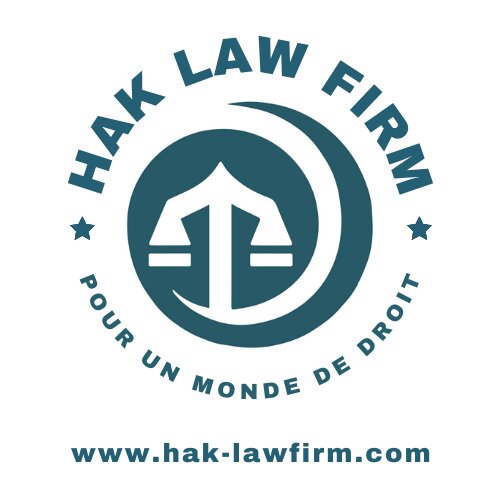Best Military Law Lawyers in DR Congo
Share your needs with us, get contacted by law firms.
Free. Takes 2 min.
Or refine your search by selecting a city:
List of the best lawyers in DR Congo
About Military Law in DR Congo
Military Law in the Democratic Republic of the Congo (DRC) governs the conduct of members of the military forces and deals with matters such as military discipline, offenses, trials, legal processes, and the rights of military personnel. It is separate from civilian law, although it can intersect with criminal and constitutional laws in certain circumstances. The framework for military justice in the DRC is primarily outlined in the Congolese Military Penal Code and other relevant military regulations, which are influenced by both domestic law and international standards.
Why You May Need a Lawyer
There are several situations in which individuals may require the assistance of a lawyer specializing in Military Law within the DRC:
- Facing Military Charges: If you are a member of the military facing charges such as insubordination, desertion, or other service-related offenses.
- Disciplinary Actions: When faced with disciplinary actions that could affect your rank, pay, or future in the military.
- Understanding Rights: Needing assistance in understanding your rights within military service, including rights related to the Uniform Code of Military Justice (UCMJ).
- Military Appeals: When you require legal representation for appeals within the military judicial system.
- Human Rights Violations: Facing complexities involving allegations of human rights violations or war crimes.
Local Laws Overview
The key aspects of local laws particularly relevant to Military Law in the DRC include:
- Military Penal Code: This code contains the offenses and corresponding penalties that apply specifically to military personnel.
- Military Jurisdiction: Explains which courts can adjudicate military-related issues, generally reserved for tribunal militaire.
- Right to Defense: Ensures that all accused military personnel have the right to a fair trial and the opportunity to be represented by counsel.
- International Law Compliance: Aligns military conduct and procedures with international human rights and humanitarian laws.
Frequently Asked Questions
What is the role of Military Law in DR Congo?
The role of Military Law is to maintain discipline within the armed forces, manage offenses committed by military personnel, and ensure the integrity of the military justice system.
Who is subject to Military Law in DR Congo?
All active members of the armed forces, including enlisted personnel, officers, and sometimes other affiliated groups under military command, are subject to Military Law.
What types of cases are handled by the military courts?
Military courts in the DRC handle crimes such as insubordination, desertion, mutiny, conduct unbecoming an officer, and other offenses specifically mentioned in the Military Penal Code.
Can military personnel appeal a conviction?
Yes, there are provisions for appeals in the military judicial system, and personnel can seek legal assistance to navigate this process.
Are human rights considered in military trials?
Yes, military trials are conducted with a commitment to respect human rights, aligning with both domestic and international legal standards.
How can I find a military lawyer in DR Congo?
While the state provides military legal assistance, it is also possible to seek independent legal counsel with expertise in Military Law.
What steps are involved in a military trial?
A military trial typically involves investigation, charging, pre-trial hearings, trial, potential sentencing, and appeals, adhering to procedural fairness.
Do international laws affect Military Law in DR Congo?
Yes, international treaties and conventions on human rights and armed conflict complement and influence the application of Military Law.
What is military jurisdiction?
Military jurisdiction refers to the legal authority military courts have over specific offenses and individuals related to military operations and personnel.
What should I do if I'm suspected of a military offense?
It's crucial to seek legal representation immediately to understand your rights and the potential implications of the charges.
Additional Resources
Consider reaching out to the following organizations and bodies for more information or assistance relating to Military Law:
- The Congolese Ministry of Defense: For inquiries regarding military regulations and defense policies.
- Military Justice Department: Offers information on military trials and legal proceedings.
- International Committees: Such as the International Committee of the Red Cross (ICRC), which may provide support concerning international humanitarian law.
- Public Legal Aid Services: Government offices providing legal assistance to military personnel.
Next Steps
If you need legal assistance in Military Law, consider taking the following steps:
- Identify the Issue: Clearly define your legal problem or concern related to Military Law.
- Seek Counsel: Contact a lawyer specializing in military cases as soon as possible to understand your options.
- Gather Documentation: Collect any relevant documents, evidence, or records related to your case or situation.
- Understand Your Rights: Familiarize yourself with your rights and the specific military protocols in your case.
- Schedule a Consultation: Arrange a meeting with your legal representative to discuss the next steps and potential outcomes.
Lawzana helps you find the best lawyers and law firms in DR Congo through a curated and pre-screened list of qualified legal professionals. Our platform offers rankings and detailed profiles of attorneys and law firms, allowing you to compare based on practice areas, including Military Law, experience, and client feedback.
Each profile includes a description of the firm's areas of practice, client reviews, team members and partners, year of establishment, spoken languages, office locations, contact information, social media presence, and any published articles or resources. Most firms on our platform speak English and are experienced in both local and international legal matters.
Get a quote from top-rated law firms in DR Congo — quickly, securely, and without unnecessary hassle.
Disclaimer:
The information provided on this page is for general informational purposes only and does not constitute legal advice. While we strive to ensure the accuracy and relevance of the content, legal information may change over time, and interpretations of the law can vary. You should always consult with a qualified legal professional for advice specific to your situation.
We disclaim all liability for actions taken or not taken based on the content of this page. If you believe any information is incorrect or outdated, please contact us, and we will review and update it where appropriate.
Browse military law law firms by city in DR Congo
Refine your search by selecting a city.












